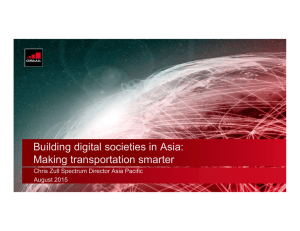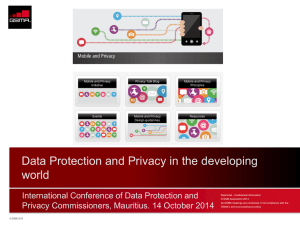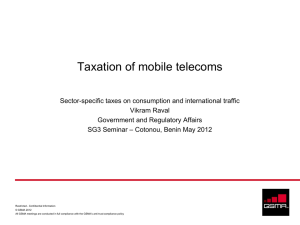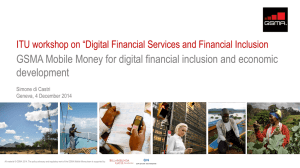GSMA Development Fund Disaster Response Programme
advertisement
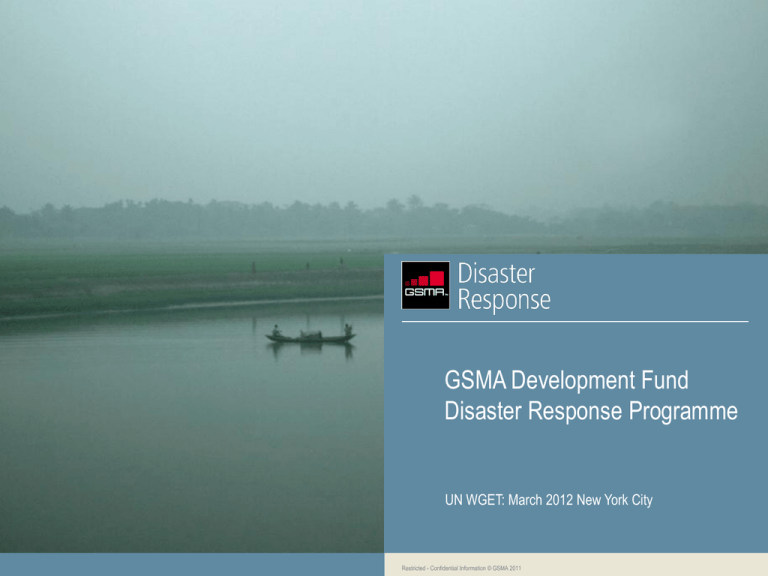
GSMA Development Fund Disaster Response Programme UN WGET: March 2012 New York City Restricted - Confidential Information © GSMA 2011 WGET 2012 The GSMA represents the interests of mobile operators worldwide. Spanning 219 countries, the GSMA unites nearly 800 of the world’s mobile operators, as well as more than 200 companies in the broader mobile ecosystem. Restricted - Confidential Information © GSMA 2011 UN WGET The furious growth of mobile We will hit 6bn connections this year 91% of global connections are made using the GSM family of technologies 4 out of 5 new connections are being made in the developing world The largest underserved markets are in remote, rural geographies and amongst women The mobile phone is a pipeline connecting the user with the accumulated knowledge of humankind, delivered via voice or data Shortly, 6bn people will be able to talk to 6bn other people, sharing knowledge, ideas and extending the scope and reach of their communities. On the horizon, technologies will evolve such that most people in developing countries will visit the internet for the first time using a mobile phone WGET 2012 Development fund programmes WGET 2012 2011, over 13 million affected by the crisis in the horn of Africa 2011 monsoon and flooding in Pakistan affected ~7.5m and destroyed over 1m homes In 2010, more than Number of displaced people globally, due to natural disasters 42 million in 2010 Great Japanese Earthquake, killed 16,000 people 300 m people were affected by natural disasters Restricted - Confidential Information © GSMA 2011 350 WGET 2012 Mobile’s role in disaster response will only grow, and as the ecosystem becomes more complex, a better understanding of how the global GSMA community can lend support is needed. Restricted - Confidential Information © GSMA 2011 WGET 2012 What does the mobile industry have to offer? Brand familiarity, trust Ability to diffuse and decentralise information Broad agent networks Leadership in community service Massive human and infrastructural networks Technical expertise SCALE REACH INFRASTRUCTURE Restricted - Confidential Information © GSMA 2011 WGET 2012 Challenges for the mobile industry & stakeholders in disaster response Mobile operators can themselves be badly affected An inundation of requests Coordination with agencies Privacy and security Understanding the role of mobile data Approaching operators and communicating with stakeholders- acronym soup? Legal, licence and regulatory realities Optimism, Opportunity, Reality GSMA Disaster Response Organisational change Programme Best practices in communicating with Disaster-affected communities Information overload The ability to respond? Launch and Seminar Accountability Mobile World Congress I February 27 I 2012 Restricted - Confidential Information © GSMA 2011 WGET 2012 Restricted - Confidential Information © GSMA 2011 WGET 2012 Where are we today? Mobile operators sit across a broad spectrum in existing preparedness measures, investments and planning for emergencies and are working together informally and formally There is an increasing number of innovative, impactful solutions being driven by mobile operators, but these have typically been on an individual basis Governments and regulators view mobile networks as basic emergency infrastructure in varying degrees which impacts the provision and facilitation of resources Operators are beginning to share strategies on network preparedness and resilience, best practices, and most importantly, failures Communication needs differ during stages of a disaster, as does the contribution of mobilehow can this be planned for? Developing coordination strategies within the industry, and between MNOs, GOVT, INGO’s Understanding applications of social media and crowd sourcing over the mobile network Understanding the best practices of communicating with disaster affected communities Restricted - Confidential Information © GSMA 2011 WGET2012 Key Programme Activities and Objectives Structure: Technical Work Stream Coordination Work Stream Regionally focused working groups with MNOs, NGOs, humanitarian agencies and Government Upcoming convening's: Latin America (April), Sub-Saharan Africa (May), Horn of Africa (June), Asia (June) Activities: Research, dissemination and advocacy of technical Resources in network preparedness, restoration and resilience Development of industry-wide commitment for the provision of access to communication for disaster-affected populations Data base of emergency contacts in Mobile Operators to streamline and inform humanitarian response and associated preparedness activities Blueprint for optimal co-ordination and collaboration between ecosystem members Advocacy of integration of disaster response protocols and policies shared between Mobile Operators and governments in advance of disasters as a key component of preparedness and integration Research into role of mobile data in emergencies Code of Conduct for 2-way communications and SMS in disaster Forums for sharing lessons, best practices, trials and engaging with industry experts Restricted - Confidential Information © GSMA 2011 Community Power for Mobile WGET 2012 Restricted - Confidential Information © GSMA 2011 WGET 2012 WHAT IS THE COST OF INACTION? Restricted - Confidential Information © GSMA 2011 WGET 2012 When you restore the mobile network, you rebuild the human network Restricted - Confidential Information © GSMA 2011 For more GSMA Disaster information: Response Programme Kyla Reid, Head of Disaster Response kreid@gsm.org Launch and Seminar www.gsma.com/Disaster-Response https://bitly.com/ygILS0 Mobile World Congress I February 27 I 2012 WGET | March 2012 Restricted - Confidential Information © GSMA 2011
